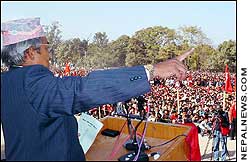 Nepali Congress president Girija Prasad Koirala's belated warning of an ugly "divide-and-rule" ploy has injected new life into the quest for consensus. The Kangresi patriarch had good reason to fear a domino effect of the departure of senior leaders from the CPN-UML. Nepal Sadbhavana Party leader Mukti Nath Mandal opted out of the all-party resolve to step up protests against the palace, saying the Maoists were the real villains. Rastriya Prajatantra Party (RPP) president Surya Bahadur Thapa told restive party colleagues that he signed that statement to promote national reconciliation. From the new warmth in the tone of UML general secretary Madhav Kumar Nepal's views on the monarch, Koirala knew he was running out of time to sound the siren. A day later, he promptly proceeded to the palace.
Nepali Congress president Girija Prasad Koirala's belated warning of an ugly "divide-and-rule" ploy has injected new life into the quest for consensus. The Kangresi patriarch had good reason to fear a domino effect of the departure of senior leaders from the CPN-UML. Nepal Sadbhavana Party leader Mukti Nath Mandal opted out of the all-party resolve to step up protests against the palace, saying the Maoists were the real villains. Rastriya Prajatantra Party (RPP) president Surya Bahadur Thapa told restive party colleagues that he signed that statement to promote national reconciliation. From the new warmth in the tone of UML general secretary Madhav Kumar Nepal's views on the monarch, Koirala knew he was running out of time to sound the siren. A day later, he promptly proceeded to the palace. During the early Panchayat years, it was postulated that politics could easily be managed by manipulating the force and foibles of 200 Nepalis. That number grew exponentially over the decades, until it overwhelmed the system. The newly legalised parties accepted the cardinal wisdom in 1990. Rabindra Nath Sharma's assertion that there were more ex-panchas in the Nepali Congress and the UML than in the RPP didn't win him the party presidency over the weekend. It did clarify how the red-carpet treatment the big parties accorded the ex-panchas in swing constituencies doomed the RPP from the start. (Six years later, the RPP hit back by forcing comrades and Kangresis to take turns propping up its leaders as prime minister.)
In a nation fragmented on so many fronts, conflict is perhaps an inevitable fact of life. The politics of confrontation shouldn't be seen as an aberration. You don't need Madisonian conviction to conclude that the only way such conflicts could be suppressed is by suppressing freedom. Robust and uninhibited exchanges in the marketplace of ideas are supposed to produce things of value, like, say, criticism of the palace for seeking to marginalise political parties. But they also are supposed to raise probing, if oftentimes plain, questions. What if the king genuinely didn't know how to rectify his errors? From restoring the House of Representatives, to announcing the election date, to forming a broad-based government in keeping with the spirit of Article 128 of the constitution, to restoring the Sher Bahadur Deuba government, the possibilities are ominously expansive. Four of the Super Six outside government shouldn't have had too many problems agreeing on some solution.
To be sure, public participation in street protests has energised our parties. Those who berated the big ones for having mauled the faith of the people have turned to mocking the assemblage of activists ensconced in the relative safety of the capital. They fail to learn from the protests of 1990 and 1979. It's not for nothing that Kathmandu is still called Nepal by old-timers.
One remarkable thing about post-4 October politics is the image makeover that seems to be underway in the mainstream. A lot of us still believe our leaders have become democrats only because their privileges are under threat. At least we're now prepared to be proved wrong. Consider the number of people who see political tint as well in the Khadka-Gupta-Wagle trio's graft travails. The people love the loud voices that are being raised in support of our liberties. We need much more, though, to conclude they resonate with genuine concern for our well being.
The political change of 1990 brought a rare opportunity to expand the Nepali city-state into a national realm that would allow the people to participate fully in collective decisions. We've come a long way since the days when the Rastriya Panchayat member from Doti used to be fixated with overflowing sewage in Baneshwar during zero hour. It's just that the national filth hasn't received the attention it deserves.
The suspension of civil liberties during the state of emergency couldn't sufficiently alert us to what we risked losing irretrievably. Much will depend on how well we have learned our lessons this time. Love them, or hate them, but our leaders aren't going to get any better than who we are. The political class, too, must have realised that the tools of the democracy campaign are infinitely different from those of a perpetual war of national liberation. Political victors need a double-strength inoculation of humility to uphold the supremacy of those they represent.


